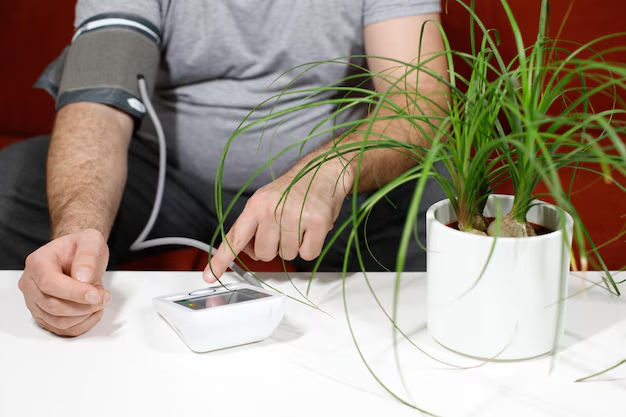Does Anxiety Lead to High Blood Pressure? Understanding the Link
Feeling anxious before a big event or during a stressful situation is a natural part of life. But have you ever wondered if these moments of anxiety can actually influence your blood pressure levels? Well, you're not alone. Many people are curious about whether the stress and tension of anxiety can lead to high blood pressure, also known as hypertension. Let's explore this intriguing connection and learn what you can do to ensure both your mental and cardiovascular well-being.
How Anxiety Affects the Body
Our Body’s Response to Anxiety
Anxiety is an emotion characterized by feelings of tension, worried thoughts, and physical changes like increased heart rate. When faced with anxiety, the body's fight-or-flight response gets triggered, preparing us to confront or flee from a perceived threat. This ancient survival mechanism involves a burst of hormones like adrenaline and cortisol.
- Adrenaline: This hormone increases heart rate, raises blood pressure, and boosts energy supplies.
- Cortisol: Known as the "stress hormone," it elevates blood sugar and enhances brain function, while also suppressing non-essential functions.
Temporary Blood Pressure Changes
During an anxiety episode, these hormonal changes can result in a temporary spike in blood pressure. This is the body's typical response as it gears up to tackle the stressor. It's important to note that while this spike is common, it doesn't mean that anxiety directly causes chronic hypertension.
Distinguishing Between Temporary and Chronic Hypertension
What Is Chronic Hypertension?
Chronic hypertension is a long-term medical condition where blood pressure remains consistently high over time. It is defined by a systolic blood pressure (the top number) of 130 mm Hg or higher and/or a diastolic blood pressure (the bottom number) of 80 mm Hg or higher.
Anxiety-Induced Blood Pressure Surges
It's crucial to differentiate between the brief elevation of blood pressure during an anxious moment and sustained elevated blood pressure which categorizes chronic hypertension. The temporary spikes associated with anxiety are usually self-limiting, meaning they return to normal once the anxiety-inducing stimulus is removed.
Anxiety and Blood Pressure: A Complex Relationship
The Role of Chronic Stress
When faced with chronic anxiety or stress, the body remains in a heightened state for longer periods. Chronic stress can lead to lifestyle or behavioral changes such as:
- Poor Diet Choices: Stress might lead individuals to consume more salty or fatty foods, which can increase blood pressure.
- Decreased Physical Activity: Anxiety can also contribute to a sedentary lifestyle, another risk factor for hypertension.
- Sleep Disturbances: Good sleep is crucial, but anxiety can disrupt sleep patterns, affecting overall health.
Underlying Health Conditions
Anxiety itself does not directly cause chronic high blood pressure, but it can exacerbate or contribute to conditions that do. For instance, individuals with existing heart conditions or those genetically predisposed to hypertension can find that anxiety plays a role in higher blood pressure episodes.
Managing Anxiety for Heart Health
Strategies to Reduce Anxiety
Addressing anxiety can help in maintaining healthy blood pressure levels. Here are some effective strategies:
- Mindfulness and Meditation: Practicing mindfulness or meditation can significantly reduce anxiety and promote relaxation.
- Regular Physical Exercise: Activities such as walking, yoga, or swimming can release endorphins, which help to improve mood and reduce stress hormones.
- Breathing Techniques: Exercises like deep breathing can calm the nervous system and lower blood pressure temporarily.
Lifestyle Modifications
- Healthy Diet: Consuming a balanced diet rich in fruits, vegetables, and whole grains supports cardiovascular health.
- Adequate Sleep: Strive for 7-9 hours of quality sleep per night to repair and rejuvenate your body.
- Limit Alcohol and Caffeine: Both substances can increase anxiety and blood pressure if consumed excessively.
When to Seek Professional Help
Understanding Warning Signs
Knowing when anxiety is more than just a fleeting feeling is vital. If you experience persistent anxiety affecting your daily life or you notice symptoms such as consistent headaches, dizziness, or heart palpitations, it's time to consult a healthcare professional.
Consulting with Healthcare Providers
Discussing your symptoms with a healthcare provider is crucial for evaluating your overall heart health and mental well-being. They might recommend treatments such as therapy, medication, or lifestyle interventions tailored to your needs.
Bringing It All Together
Understanding the relationship between anxiety and high blood pressure is essential for taking actionable steps towards a healthier life. While anxiety can cause temporary spikes in blood pressure, it doesn't directly lead to chronic hypertension. However, addressing anxiety and stress through lifestyle changes and professional guidance can significantly benefit your cardiovascular health.
Key Takeaways for Managing Anxiety and Blood Pressure:
- 🧘♂️ Incorporate Relaxation Techniques: Practice mindfulness, meditation, or breathing exercises regularly.
- 🍎 Adopt a Healthy Lifestyle: Maintain a balanced diet, exercise regularly, and ensure adequate sleep.
- 🏥 Seek Professional Guidance: Don’t hesitate to talk to healthcare providers if anxiety or blood pressure issues persist.
- 🚶♀️ Stay Physically Active: Engage in physical activities that you enjoy to naturally lower stress levels.
- ⚠️ Monitor Symptoms: Keep an eye on any persistent symptoms and adjust lifestyle choices accordingly.
By embracing these steps, you can better manage anxiety, maintain healthy blood pressure levels, and enhance your overall quality of life.

